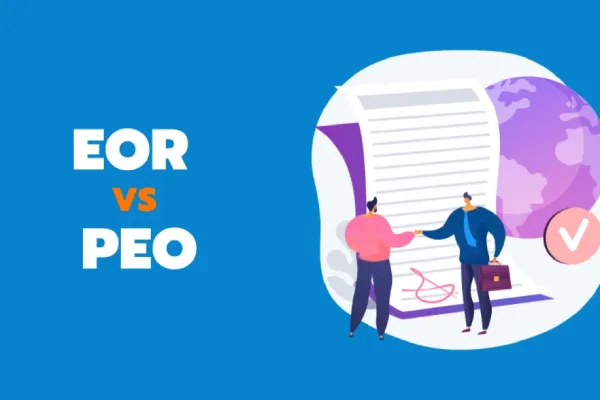Do you know how companies went international back in the day?
Think about it….No idea?? Well, it was not just a matter of sending a few job offers overseas, far from it.
Businesses had to set up legal entities in every new country. They had to manage labor laws, payroll management in multiple currencies without local expertise.
It was prolonged. Expensive. Risky. And growth? Often delayed for months or even years.
Fast forward to today, and the story looks different. Modern HR outsourcing models like PEOs (Professional Employer Organizations) and EORs (Employers of Record) have changed the rules. Now you can hire, pay, and manage people worldwide, without being weighed down by legal or compliance challenges. These solutions make it easier for companies to operate more efficiently.
However, many business leaders assume Employer of Record vs PEO are the same thing (interchangeable). They are not. While both fall under HR outsourcing, they vary significantly in how they shape partnerships, allocate responsibilities, and manage risk. So, in this article, we’ll break it down in a straightforward way, leaving no room for confusion.
What Does PEO Stand For in HR?
PEO = Professional Employer Organization. The simplest way to think about a PEO is as a co-pilot for your HR department.
When you partner with a PEO, you enter into what’s called a co-employment model. In this arrangement, both your company and the PEO share employer responsibilities.
- Your employees still belong to you. You manage their daily work, culture, and overall direction.
- The PEO steps in to handle the administration load: payroll processing, benefits, compliance with employment regulations, workers’ compensation, and similar HR tasks.
- You and the PEO appear together on employment paperwork.
Practically speaking, this model gives small and mid-sized businesses access to enterprise-level HR services. Even a team of 50 can roll out healthcare benefits that mirror the perks of a Fortune 500 giant.
It’s less about “giving away” control and more about sharing HR burdens with experts.
What Is an Employer of Record (EOR) in Global Hiring?
An Employer of Record is different in one key way: they don’t share employer status with you. They become the legal employer of your workers on paper.
Here’s what that looks like in practice:
- The EOR signs contracts with your employees.
- Handles payroll, taxes, benefits, and compliance obligations.
- Lets you stay focused on assigning tasks, leading projects, and running the business.
This model is especially powerful for international expansion. Want to hire in Brazil, Spain, or India without creating a legal entity there? An EOR makes it possible. They’re already registered locally, so you can hire talent in weeks instead of waiting months to establish a subsidiary.
It’s essentially a plug-and-play system: you keep the talent, they take the compliance burden.
PEO Pros and Cons
Every model comes with advantages and trade-offs, and a PEO is no exception.
Pros of PEOs
- Stronger Employee Benefits – PEOs pool multiple client companies to negotiate better rates on healthcare, retirement plans, and perks. Employees win big.
- Reduced HR Admin – Payroll processing, tax filings, and onboarding paperwork are handled on your behalf.
- Expert Compliance Support– PEOs track changing labor laws, helping you stay safe.
- Built-in Scalability– As your business expands, the PEO’s infrastructure expands with you.
Cons of PEOs
- Shared Liability – Because it’s a co-employment model, you’re still legally responsible for certain HR risks.
- Limited for Global Expansion – Most PEOs only operate domestically, so you’ll still need to set up entities abroad.
- Potentially Higher Costs – For some smaller businesses, the fees outweigh the benefits.
- System Limitations – You’ll often need to adapt to the PEO’s platforms and processes, rather than your own.
Employer of Record Pros and Cons
Now let’s flip to the Employer of Record pros and cons.
Pros of EORs
- Full Legal Risk Transfer – The EOR takes complete liability as the official employer.
- Global Hiring Power – Hire in 100+ countries without setting up entities. Perfect for remote-first teams.
- Speed to Market – Expansion in weeks, not months.
- Simplified Compliance – Taxes, benefits, and contracts are all handled locally.
Cons of EORs
- Less Formal “Ownership” – Employees are technically employed by the EOR, not your company. This can sometimes cause perception issues.
- Costs Can Add Up – Especially if you only need one or two hires in a foreign market.
- Limited Control Over Benefits Design – The EOR provides what they can locally, but you may not be able to customize packages extensively.
PEO vs Employer of Record: The Key Differences
At first glance, a Professional Employer Organization (PEO) and an Employer of Record (EOR) might look like two sides of the same coin. Both handle HR, payroll, and compliance. Both reduce the administrative burden on your business.
But the core difference lies in who is the “legal employer” and how far their reach extends.
Here’s a side-by-side breakdown:
| Factor | Professional Employer Organization | Employer of Record |
| Legal Employer | Co-employment model. You and the PEO share employer responsibilities. Your business remains a legal employer alongside the PEO. | Sole employer on record – the EOR becomes the legal employer of your staff, while you direct their work. |
| Liability & Compliance | The PEO helps manage compliance, but you remain partly liable. | The EOR carries legal liability for payroll, taxes, and local labour law compliance. |
| Geographic Reach | Domestic. Best for HR outsourcing within one country. Limited global support | Ideal for international hiring without setting up foreign entities. |
| Entity Needed | You must already have a legal entity in the country where you hire. | No entity required – the EOR acts as the hiring entity on your behalf. |
| Best for | Small and mid-sized businesses seeking domestic HR efficiency and better employee perks. | Companies expanding internationally or hiring remote talent across multiple countries. |
| Cost Structure | Affordable, but costs depends on the provider. | EOR is costlier than PEO. |
How to Decide: EOR or PEO?
Here’s a practical framework:
- Choose a PEO if…
- You’re a small or mid-sized business growing domestically.
- You want access to stronger benefits without managing HR complexity yourself.
- You’re comfortable sharing legal responsibility.
- You’re a small or mid-sized business growing domestically.
- Choose an EOR if…
- You’re expanding into new countries and don’t want to set up legal entities.
- You want speed and simplicity in hiring global talent.
- You prefer to transfer all compliance risk.
- You’re expanding into new countries and don’t want to set up legal entities.
Many companies use both. A startup might begin with a PEO for local HR and later adopt an EOR for international hiring.
Bringing All This Together
Global growth no longer requires years of entity setup and endless compliance struggles. With the right partner, you can scale smarter—whether that’s a PEO sharing your HR load or an EOR carrying the full legal responsibility.
It’s not a question of which is “better.” It’s about fit.
- Want domestic HR efficiency and better benefits? Go with a PEO.
- Want cross-border hiring and compliance? Choose an EOR.
Either choice frees you from the old, slow, expensive way of expanding. The future of work is flexible and borderless. The only thing left to decide is which model fits your journey.






